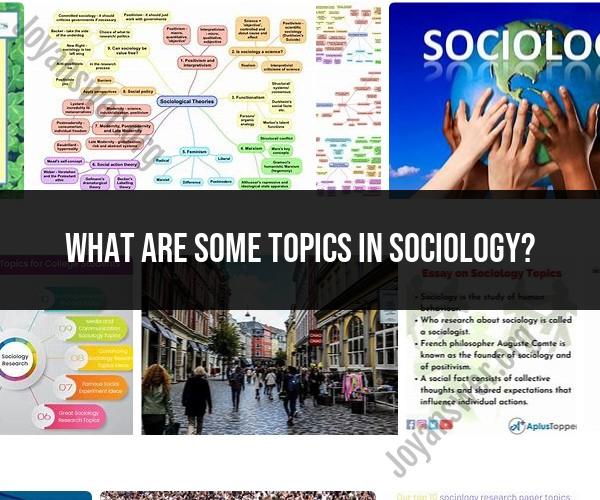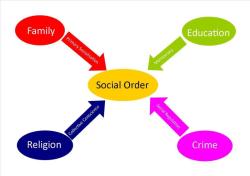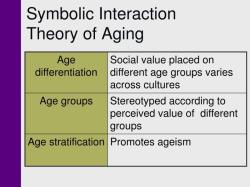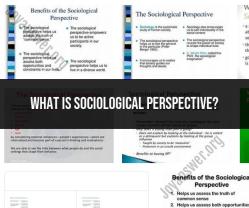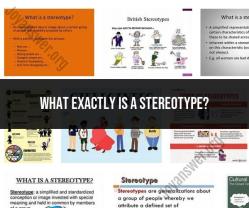What are some topics in sociology?
Sociology is a diverse and multifaceted field that examines various aspects of human society, behavior, and interaction. Here are some topics in sociology that researchers, students, and sociologists explore:
Socialization: The process by which individuals learn and internalize the norms, values, and behaviors of their society or culture.
Social Institutions: The structures and systems that organize and guide various aspects of society, including family, education, religion, government, and the economy.
Social Stratification: The study of how society ranks individuals or groups based on factors such as income, education, occupation, and social status, leading to social classes and inequality.
Race and Ethnicity: The examination of how race and ethnicity impact social identities, discrimination, and disparities in areas like education, employment, and criminal justice.
Gender and Sexuality: The study of how society constructs and enforces gender roles, norms, and expectations, as well as the experiences of LGBTQ+ individuals.
Deviance and Social Control: The analysis of behaviors, norms, and actions that are considered deviant and the mechanisms society uses to control and respond to them, including the criminal justice system.
Social Change: The exploration of how societies evolve over time, adapt to new technologies, and respond to social, political, and economic shifts.
Globalization: The study of how societies are interconnected on a global scale, impacting culture, economics, politics, and social relations.
Health and Healthcare: The examination of access to healthcare, healthcare disparities, and the social determinants of health.
Urban Sociology: The analysis of urbanization, urban planning, and the effects of city life on individuals and communities.
Environmental Sociology: The study of the relationship between human societies and the natural environment, including issues like climate change, sustainability, and environmental justice.
Family and Marriage: The exploration of family structures, dynamics, and changes in family life over time.
Religion: The examination of religious beliefs, practices, and their impact on individuals and society, including religious diversity and secularization.
Education: The analysis of educational systems, access to education, and the role of education in social mobility and inequality.
Political Sociology: The study of the impact of politics on society and the influence of social factors on political behavior, institutions, and policies.
Media and Technology: The examination of how media, technology, and communication shape public opinion, culture, and social interactions.
Social Movements and Collective Behavior: The analysis of organized efforts to promote social change, protest movements, and the dynamics of collective behavior.
Work and Labor: The exploration of labor markets, workplace dynamics, job satisfaction, and the impact of technology on employment.
Community and Social Networks: The study of how individuals form and maintain social connections, including online communities and social media.
Migration and Immigration: The examination of migration patterns, the integration of immigrants into host societies, and the impact of migration on both sending and receiving countries.
These topics represent just a portion of the vast and evolving field of sociology. Sociologists continually explore and analyze various aspects of human society to gain insights into social behaviors, structures, and interactions.
Sociology Topics: A Wide Range of Social Issues
Sociology is the study of human society and social behavior. Sociologists examine a wide range of topics, including:
- Social institutions, such as the family, education, and religion
- Social groups, such as race, class, and gender
- Social problems, such as crime, poverty, and inequality
- Social change, such as globalization and technological innovation
Sociology can help us to understand the social world around us and to identify the factors that contribute to social problems. It can also help us to develop solutions to these problems.
Delving into Sociology: Fascinating Topics and Areas of Study
Here are some specific examples of fascinating topics and areas of study in sociology:
- Social movements: Sociologists study the rise and fall of social movements, as well as the factors that motivate people to participate in them.
- Education: Sociologists study the sociology of education, which examines the social factors that influence educational outcomes.
- Work: Sociologists study the sociology of work, which examines the social organization of work and the impact of work on people's lives.
- Health: Sociologists study the sociology of health, which examines the social factors that influence health and illness.
- Technology: Sociologists study the sociology of technology, which examines the social impact of technology.
These are just a few examples of the many fascinating topics that sociologists study. Sociology is a broad and diverse field, and there is something for everyone to be interested in.
The Social World Unveiled: Intriguing Subjects in Sociology
Sociology can help us to see the social world in new and different ways. It can help us to understand the complex forces that shape our lives and the lives of others.
For example, sociology can help us to understand:
- Why some people are more likely to commit crimes than others.
- Why some groups are more disadvantaged than others.
- How social media is changing the way we interact with each other.
- How globalization is affecting our economy and our culture.
Sociology is a powerful tool for understanding the social world around us. It can help us to make sense of our experiences and to create a better future for ourselves and for others.
If you are interested in learning more about sociology, there are many resources available to you. You can take sociology courses at your local college or university, or you can read books and articles on sociological topics. There are also many online resources available, such as the American Sociological Association website.
